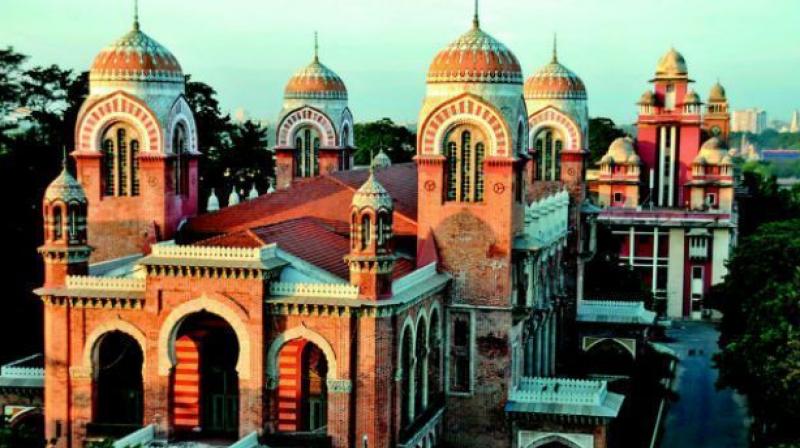Madras University's syndicate meeting on IDE debacle tomorrow
On an average, the IDE will attract anywhere between 28,000 and 30,000 students every year.

Chennai: The University Grants Commission’s decision to not to allow the University of Madras to conduct distance mode programmes except for three courses may incur heavy loss running into Rs 8 to 10 crores to the university already facing the severe financial crisis in this academic year.
The possibility of the financial crisis has forced the university to advance the syndicate meeting to August 23 from August 31 to discuss the issue and recommend a solution, sources in the university said.
The Madras University has submitted applications to conduct 23 UG programmes, 22 PG courses and 8 professional courses to the UGC.
But the commission has granted permission to offer only three courses B.A. and M.A. Public Administration and M.A. Political Science citing inadequate faculty in the Institute of Distance Education as per UGC regulations 2017.
It also stated that the professional courses like MBA and MCA, B.Ed, and M Ed, in distance mode will be allowed only after getting the approval of AICTE and NCTE (for B.Ed., and M.Ed.,) courses from 2018-19 onwards.
According to sources, the IDE at present has got only 8 faculty members for eight different departments whereas the new regulations demand 2 faculty members dedicated full time for open and distance learning courses per discipline or specialization.
On an average, the IDE will attract anywhere between 28,000 and 30,000 students every year. More than 50 per cent of these candidates will get enrolled in MBA courses alone.
“The IDE courses are the main revenue source to the university and it would generate around '8 to 10 crore per year. It is an utter failure on the part of IDE officials who did not read the regulations fully and comply with it. If the university does not take any corrective action, it may not be able to pay even the salary to the university staff,” professors said.
“The university is now planning to transfer seven to eight faculty members from the main departments to IDE to improve the faculty strength,” they added.
A section of professors argued that IDE is not a separate entity, but one of the departments of the university. “There has never been any restriction on regular staff teaching IDE courses or vice-versa. The faculty members from regular departments are assigned the coordination work of the IDE programmes,” professors said.
For example, the programmes like M.A. Music, M.Sc., Geography are entirely run by regular staff.
“Under these circumstances, it makes no sense to claim that IDE has no staff strength since nothing prevents regular staff from teaching and co-ordinating IDE courses. The IDE director and other officials who have presented before UGC did not claim that the regular staff also co-ordinate IDE programmes. This mistake has led to the present crisis,” sources claimed.
For several years, the university also facing a severe shortage of staff members as two-third of sanctioned posts in the university is lying vacant.
“Over the years, the IDE faculty members recruited to coordinate and offer IDE courses were moved to regular departments with the approval of the Syndicate. It has also depleted the staff strength in the IDE and now resulted in denial of permission from the UGC,” professors said.
While accepting that IDE officials did not take the UGC regulations seriously before applying for approval, the university officials argued that other norms including Choice Based Credit System were implemented for distance mode programmes.
Professors said it is a blunder and IDE officials should be held accountable for the debacle.
However, Madras University Vice-Chancellor P.Duraisamy was confident that the university would be able to correct the shortcomings and get the approval from the UGC for a majority of the courses.
“We want to comply with all the UGC regulations and offer only UGC approved programmes to our students. The issue could be solved in different ways. The syndicate of the university on Thursday will take a final call on the issue,” he said.
When asked about the suggestions that the IDE could have got permission to all the courses by insisting all the courses run by dual mode and supported by regular staff, he said, “the UGC has clearly mentioned that for every course or department, the IDE should have a minimum of two faculty members. We did not get approval for all distance courses except political science and public administration due to the shortage of faculty members.”
For professional courses like MBA and MCA, the UGC did not give permission to any of the 51 institutions citing they did not get permission from All India Council for Technical Education (AICTE). “But, the AICTE did not have a separate approval process for IDL mode courses. We hope the UGC will allow the institutions to run these courses until the alternate arrangements are made,” he added.The university has got approval from the finance committee for recruiting new staff members. “The process to fill the vacancies has already begun. We will fill all regular and IDE vacancies in near future,” Mr.Duraisamy said.

